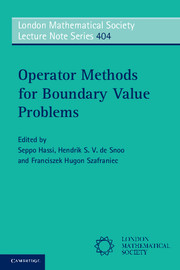Book contents
- Frontmatter
- Contents
- List of contributors
- Preface
- 1 John Williams Calkin: a short biography
- 2 On Calkin's abstract symmetric boundary conditions
- 3 Boundary triplets and maximal accretive extensions of sectorial operators
- 4 Boundary control state/signal systems and boundary triplets
- 5 Passive state/signal systems and conservative boundary relations
- 6 Elliptic operators, Dirichlet-to-Neumann maps and quasi boundary triples
- 7 Boundary triplets and Weyl functions. Recent developments
- 8 Extension theory for elliptic partial differential operators with pseudodifferential methods
- 9 Dirac structures and boundary relations
- 10 Naĭmark dilations and Naĭmark extensions in favour of moment problems
- References
3 - Boundary triplets and maximal accretive extensions of sectorial operators
Published online by Cambridge University Press: 05 November 2012
- Frontmatter
- Contents
- List of contributors
- Preface
- 1 John Williams Calkin: a short biography
- 2 On Calkin's abstract symmetric boundary conditions
- 3 Boundary triplets and maximal accretive extensions of sectorial operators
- 4 Boundary control state/signal systems and boundary triplets
- 5 Passive state/signal systems and conservative boundary relations
- 6 Elliptic operators, Dirichlet-to-Neumann maps and quasi boundary triples
- 7 Boundary triplets and Weyl functions. Recent developments
- 8 Extension theory for elliptic partial differential operators with pseudodifferential methods
- 9 Dirac structures and boundary relations
- 10 Naĭmark dilations and Naĭmark extensions in favour of moment problems
- References
Summary
Abstract This chapter is a survey of results related to the problem of a description of all maximal accretive extensions for a densely defined sectorial operator; the problem in more generality was originally posed by R. Phillips. We also treat maximal sectorial extensions. Our approach uses the concepts of boundary pairs and boundary triplets.
Introduction
A linear operator S in a complex Hilbert space h is called accretive [Kato, 1995] if Re (Su, u) ≥ 0 for all u ∈ dom S. An accretive operator S is called maximal accretive (m-accretive) if one of the following equivalent conditions is satisfied [Kato, 1995; Lyantse, 1954; Phillips, 1959a, b, 1969]:
the operator S is closed and has no accretive extensions in h;
ρ(S) ∩ ≠ 0, where π_ denotes the open left half-plane;
the operator S is densely defined and closed, and S* is accretive;
the operator −S generates a one-parameter contractive semigroup T(t) = exp(−tS), t ≥ 0.
The resolvent set ρ(S) of an m-accretive operator contains the open left half-plane and
The class of m-accretive operators plays an essential role in differential equations, scattering theory, stochastic processes, passive linear systems and, for instance, hydrodynamics. It should be noted that Phillips calls an operator A dissipative if −A is accretive. Nowadays the term dissipative is used for operators A with Im (Af, f) ≥ 0.
The Phillips problem is to find all m-accretive extensions of a densely defined accretive operator; cf. [Phillips, 1959a, b, 1969].
Information
- Type
- Chapter
- Information
- Operator Methods for Boundary Value Problems , pp. 35 - 72Publisher: Cambridge University PressPrint publication year: 2012
References
Accessibility standard: Unknown
Why this information is here
This section outlines the accessibility features of this content - including support for screen readers, full keyboard navigation and high-contrast display options. This may not be relevant for you.Accessibility Information
- 8
- Cited by
